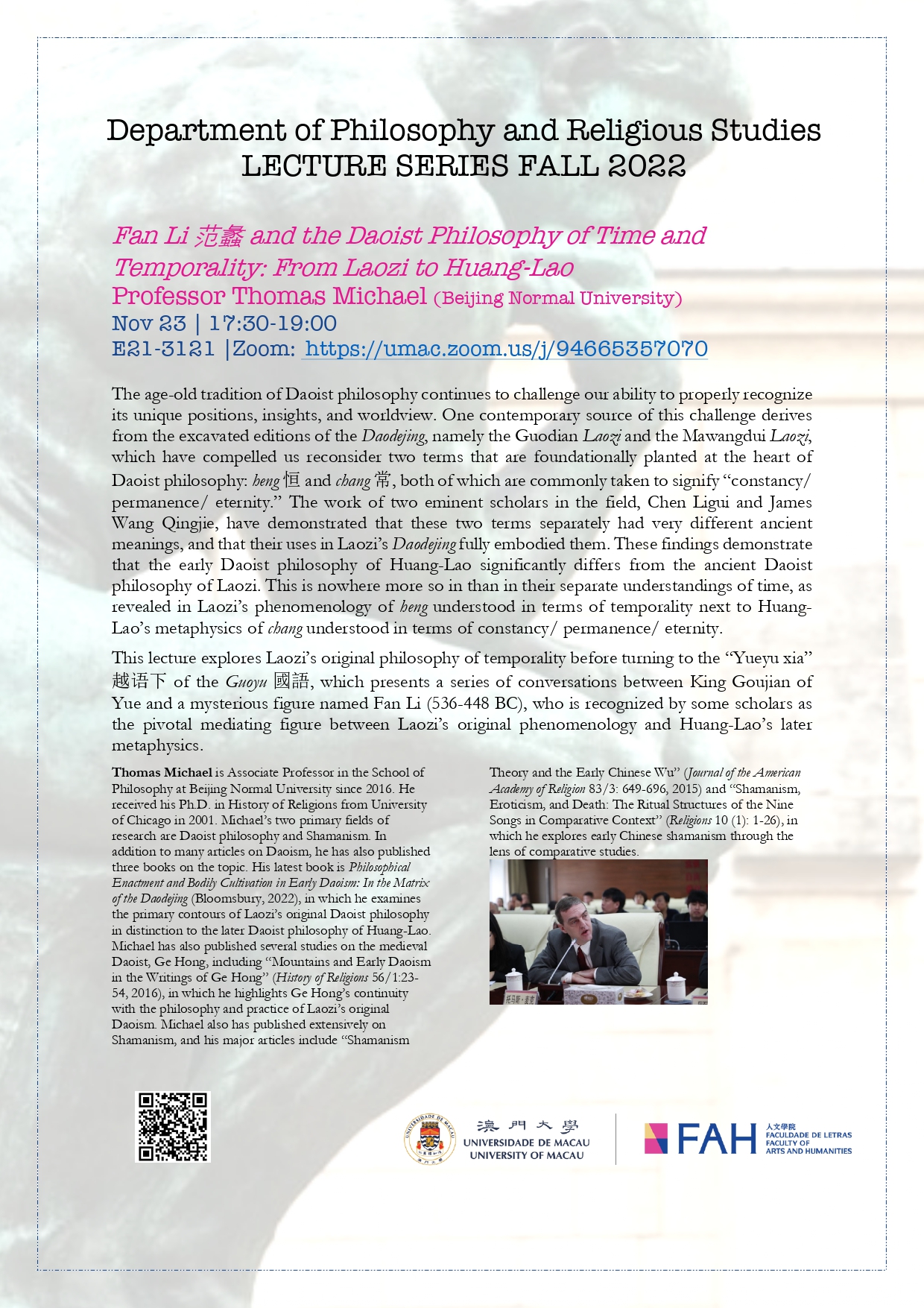

FAH/DPHIL Lecture Series – “Fan Li 范蠡and the Daoist Philosophy of Time and Temporality: From Laozi to Huang-Lao” by Prof. Thomas Michael, Beijing Normal University, China
2022-11-23 @ 5:30 pm ~ 7:00 pm
Zoom: https://umac.zoom.us/j/94665357070
Abstract
The age-old tradition of Daoist philosophy continues to challenge our ability to properly recognize its unique positions, insights, and worldview. One contemporary source of this challenge derives from the excavated editions of the Daodejing, namely the Guodian Laozi and the Mawangdui Laozi, which have compelled us reconsider two terms that are foundationally planted at the heart of Daoist philosophy: heng 恒 and chang 常, both of which are commonly taken to signify “constancy/ permanence/ eternity.” The work of two eminent scholars in the field, Chen Ligui and James Wang Qingjie, have demonstrated that these two terms separately had very different ancient meanings, and that their uses in Laozi’s Daodejing fully embodied them. These findings demonstrate that the early Daoist philosophy of Huang-Lao significantly differs from the ancient Daoist philosophy of Laozi. This is nowhere more so in than in their separate understandings of time, as revealed in Laozi’s phenomenology of heng understood in terms of temporality next to Huang-Lao’s metaphysics of chang understood in terms of constancy/ permanence/ eternity.
This lecture explores Laozi’s original philosophy of temporality before turning to the “Yueyu xia” 越语下 of the Guoyu 國語, which presents a series of conversations between King Goujian of Yue and a mysterious figure named Fan Li (536-448 BC), who is recognized by some scholars as the pivotal mediating figure between Laozi’s original phenomenology and Huang-Lao’s later metaphysics.
Bio
Thomas Michael is Associate Professor in the School of Philosophy at Beijing Normal University since 2016. He received his Ph.D. in History of Religions from University of Chicago in 2001. Michael’s two primary fields of research are Daoist philosophy and Shamanism. In addition to many articles on Daoism, he has also published three books on the topic. His latest book is Philosophical Enactment and Bodily Cultivation in Early Daoism: In the Matrix of the Daodejing (Bloomsbury, 2022), in which he examines the primary contours of Laozi’s original Daoist philosophy in distinction to the later Daoist philosophy of Huang-Lao. Michael has also published several studies on the medieval Daoist, Ge Hong, including “Mountains and Early Daoism in the Writings of Ge Hong” (History of Religions 56/1:23-54, 2016), in which he highlights Ge Hong’s continuity with the philosophy and practice of Laozi’s original Daoism. Michael also has published extensively on Shamanism, and his major articles include “Shamanism Theory and the Early Chinese Wu” (Journal of the American Academy of Religion 83/3: 649-696, 2015) and “Shamanism, Eroticism, and Death: The Ritual Structures of the Nine Songs in Comparative Context” (Religions 10 (1): 1-26), in which he explores early Chinese shamanism through the lens of comparative studies.

